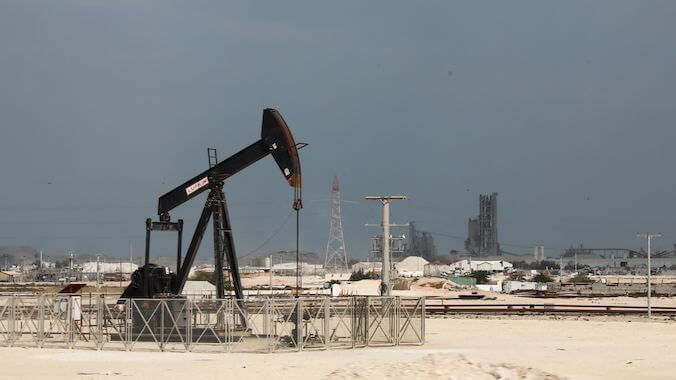What Good Is the Paris Agreement if Companies and Countries Emit More After It Passed?
Photo by Jakub Porzycki/NurPhoto/Shutterstock
Only a handful of companies and “state producing entities” are responsible for the huge bulk of global emissions, according to the latest version of a report on information from the Carbon Majors Database. And they’re only getting worse in the age of the Paris Agreement.
The report, from non-profit think tank InfluenceMap, counts up cumulative greenhouse gas emissions from a relatively small collection of sources dating back to 1854, a total of more than 1.4 trillion tons of the stuff representing 72% of all emissions. Over 70 percent of all those emissions can be attributed to just 70 corporate and state producing entities. Historically, the culprits you might guess are responsible for the most: Chevron, ExxonMobil, and BP lead the way, along with Saudi Aramco, Gazprom, and so on; overall, investor-owned companies account for 31 percent of all emissions.
None of this is all that surprising. Where it gets worse is when the researchers analyzed specifically the emissions since 2016, the year the Paris Agreement to slow climate change went into effect. Since then, the database tracks about 250 billion tons of emissions, representing almost 90 percent of the global total. Of that amount, 80% can be tracked to just 57 corporate and state entities.
The time you left a light on by accident when you went away for the weekend is very much not the problem.
(Because China’s coal use is considered as an entity where no one company is responsible, it easily dominates the list. More than a quarter of all the emissions tracked since 2016 come from China’s coal.)
Even worse: the biggest emitters are not slowing down. In the era of a supposed ongoing transition toward a net-zero economy, 58 of 100 entities included for the period since 2016 have expanded their fossil fuel production operations compared with the seven years before the Paris Agreement. The post-Paris emissions account for more than 12 percent of all emissions since 1751, in only 2.6 percent of the time.
From the very beginning, critics cited the Paris Agreement’s lack of teeth as a problem for its potential success. If nothing is really there to stop ExxonMobil or Saudi Aramco or Gazprom from drilling and burning all the oil and gas they possibly can, why would they?